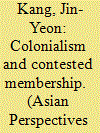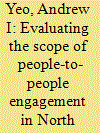| Srl | Item |
| 1 |
ID:
153577


|
|
|
|
|
| Summary/Abstract |
In this article I address explanations of postcolonial state formation in Korea. Focusing on the impact of Japanese colonial legacies on Korea in the early period of US occupation, I examine how the historical experience of colonial rule reformulated people's perception of collective membership in the national community, thereby conditioning and shaping Korea's postcolonial division. I pay particular attention to the historically shifting nature of collective identity and sense of belonging. My argument is that the significance of colonialism lies not merely in its institutional reproduction but especially in relational changes of the indigenous people and in reconstructing the meaning of nation and political community.
|
|
|
|
|
|
|
|
|
|
|
|
|
|
|
|
| 2 |
ID:
153574


|
|
|
|
|
| Summary/Abstract |
In this article we examine the politics of state-owned enterprise (SOE) reform in South Korea, specifically the privatization of Korea Electric Power Corporation. We focus on the policymaking process among government agencies and actors involved in SOE reform. The policy actors are identified, as are their preferences—efficiency versus the public good—and the strategies adopted to pursue them. The case illustrates how a particular SOE reform policy can take a long time to work through as each stakeholder attempts to pursue its preferences using various political ideologies and strategies in ever changing social, economic, and political environments. We present the lessons of the case for SOE reform.
|
|
|
|
|
|
|
|
|
|
|
|
|
|
|
|
| 3 |
ID:
153579


|
|
|
|
|
| Summary/Abstract |
Although North Korea remains one of the most isolated countries in the world, hundreds of foreign actors continue to work quietly inside the country. What is the size and scope of foreign engagement inside the Democratic People's Republic of Korea (DPRK)? What types of activities do nongovernmental organizations, businesses, and other private actors conduct? What has been the experience and impact of those working inside the DPRK? Relying on an original data set and interviews with sixteen organizational field representatives and staff members with experience working inside the DPRK, I uncover basic trends related to people-to-people engagement in areas such as humanitarian relief, development assistance, educational assistance, professional training, and business interaction. Although impressive growth has taken place in foreign engagement in the DPRK, its potential impact remains unclear due to ongoing internal and external constraints.
|
|
|
|
|
|
|
|
|
|
|
|
|
|
|
|
| 4 |
ID:
153573


|
|
|
|
|
| Summary/Abstract |
THE REFORM OF STATE-OWNED ENTERPRISES (SOES) HAS BEEN A
leading element of public sector reform since the 1980s. Starting
with the radical actions of Margaret Thatcher’s government in
the United Kingdom, privatization was disseminated across the
world. By 2004, over $1 trillion of SOEs had been privatized.
The privatization stampede represented the ascendancy of neoclassical
economics and the view that governments should get
out of business and leave the invisible hand of the market to
either generate efficiency in often poorly performing enterprises
or simply close them down (World Bank 1995, 1996, 1997).
This neoliberal policy orientation dovetailed with the Washington
Consensus and the spread of New Public Management, both
of which sought leaner, more fiscally disciplined government
that focused on core functions (Turner, Hulme, and McCourt
2015).
|
|
|
|
|
|
|
|
|
|
|
|
|
|
|
|
| 5 |
ID:
153575


|
|
|
|
|
| Summary/Abstract |
State-owned enterprise (SOE) reform was introduced into Vietnam as a component of the Doi Moi economic reforms that began in 1986 and aimed to replace central planning with a more market-oriented economy. SOEs had performed poorly and were a drain on government resources. In this article we use a political economy framework to trace SOE reform through the various stages of policymaking and implementation. While the number of SOEs has been reduced, privatization (“equitization” in Vietnam) of large enterprises has proved more difficult as it has threatened the interests of powerful stakeholders. We use two case studies of large Vietnamese SOEs to demonstrate and explain both success and failure in SOE reform.
|
|
|
|
|
|
|
|
|
|
|
|
|
|
|
|
| 6 |
ID:
153576


|
|
|
|
|
| Summary/Abstract |
In this article we trace the history of state-owned enterprise (SOE) reform in Laos. Commencing in 1986, SOE reform was a component of the New Economic Mechanism (NEM), a program of changes that moved the economy toward one based on market principles. SOE reform is located within the broader reforms associated with the NEM and is divided into three distinct phases. We present and analyze a case study of the reform of the national electricity company (Électricité du Laos) in terms of a stages model of power sector reform. The overall findings show the importance of context in influencing the specific nature of SOE reform.
|
|
|
|
|
|
|
|
|
|
|
|
|
|
|
|